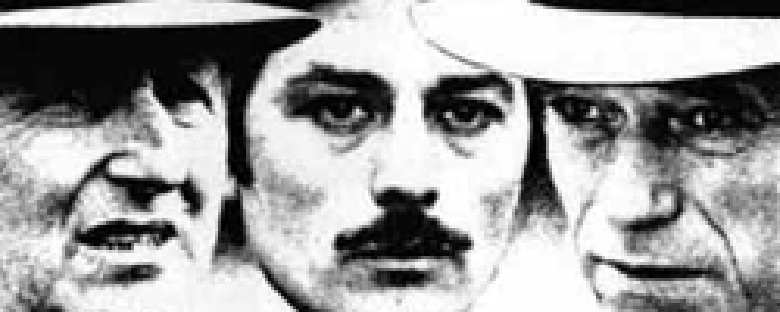Reviews
Jean-Pierre Melville
France, 1970
Credits
Review by Matt Bailey
Posted on 10 July 2004
Source Rialto Pictures 35mm print
Related articles
Reviews: Le Doulos
Reviews: Le Samouraï Reviews: Army of Shadows
Throughout film history, there have been several actor/director pairs whose collaborations have resulted in something more than the sum of their parts and whose films explored what it meant to be a man in the modern world. In the classical Hollywood era, there were the pairings of Humphrey Bogart and John Huston, Cary Grant and Howard Hawks, and John Wayne and John Ford, to mention only a few. Across the oceans, there were Mifune Toshiro and Kurosawa Akira, Marcello Mastroianni and Federico Fellini, Erland Josephson and Ingmar Bergman, Jean-Paul Belmondo and Jean-Luc Godard, and Jean-Pierre Leaud and François Truffaut, to mention only the most famous. One collaboration that may not come immediately to mind is that of the actor Alain Delon and the director Jean-Pierre Melville. Though they made only three films together, those films have become the work for which each is best remembered. Le Cercle Rouge is one of those films.
Nearly all the films that Jean-Pierre Melville made were set in the criminal underworld of Paris and were heavily influenced by American Noir. With the cooperation of his gifted cinematographer Henri Decaë, however, Melville developed a highly individual style, eschewing the grit and grime of the American style. Shots are uncluttered and simple; camera movements are brisk and unpretentious. In front of the camera are clean, modern, almost barren settings, suffused with the bright neon lights of the Paris night. Criminals invariably dress on the verge of dandiness in anachronistic snap-brim hats, slim suits with skinny ties, and the requisite trench coat and drive classic American cars exclusively. Whether it is the 1950s of Bob le Flambeur or the 1970s of Un Flic or Le Cercle Rouge, Melville’s Paris and its inhabitants are seemingly fixed in a post-war era that is both futuristic and nostalgically retro.
Also characteristic of Melville’s films is the moral ambiguity of police and criminal alike. In Melville’s world, the police will stop at nothing to enforce the law, even if that means breaking it. Underhanded tactics, blackmail, entrapment, and payoffs are all part of the job. The criminals, on the other had, live by a very strict and inviolable code of honor and only the lowliest criminal would aid the police. It is emblematic of this moral topsy-turvydom that the most charismatic and beloved character in Le Cercle Rouge is a former police sharpshooter (played by Yves Montand) who assists in a jewel heist but expects no monetary reward.
Melville’s films and his heroes are marked by an extreme laconicism. Anything that can be shown with the camera instead of told through dialogue is. Any piece of information that can be conveyed in one shot instead of two is. Anything that can be expressed with a look instead of said with a word is. No one embodied the stoic, opaque Melville hero better than Alain Delon.
Delon, whose career began with roles as hitmen and thieves and whose off-camera life included run-ins with the French criminal underworld, was initially more popular for his incredible beauty than for any skill he possessed as an actor. Through his blankness, however, he seemed to embody the untouchable elegance and glamour of the French criminal that has obsessed French filmmakers from Louis Feuillade on, a persona that was in sharp contrast to the American gangster as portrayed by frankly ugly men such as Edward G. Robinson and Humphrey Bogart. Though Delon eventually became a French cultural idol on the level of Brigitte Bardot (there are still stories on him in just about every other issue of Paris-Match), and portrayed everything from cops to counts, his iconic roles are those of Jef Costello in Le Samouraï and Corey in Le Cercle Rouge.
As fans of Melville’s other films might expect, the dialogue of Le Cercle Rouge is spare, spans of silence run for minutes, the tense atmosphere is punctuated by unexpected eruptions of violence, and the film does not end happily for anyone. Although the film was Melville’s biggest success in France, it has gone unreleased and unknown in its complete form in the United States. Even though Melville’s critical reputation is still rising in this country, it is pretty much a given that he never made a bad film. Anyone who thinks that his Le Samouraï is the pinnacle of the French crime film, though, should expect to be pleasantly surprised by Le Cercle Rouge.
We don’t do comments anymore, but you may contact us here or find us on Twitter or Facebook.



